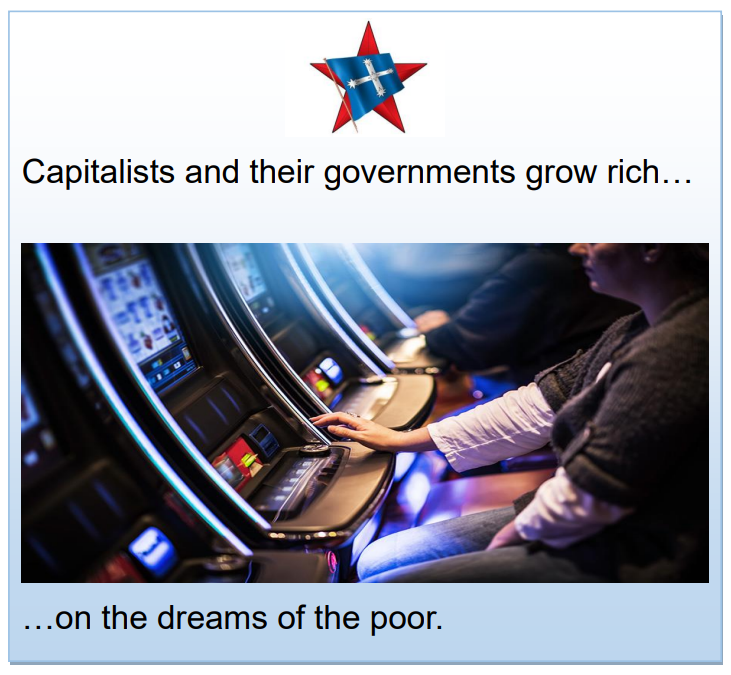Gambling and Politics (or Pokies and Pollies)
Written by: Jed J. on 21 March 2023
The current debate about gambling in the NSW election campaign can be seen as a microcosm of the relationship between governments and businesses in capitalist societies.
That gambling in general and poker machines in particular are a blight on society is not hard to see.
One has only to look at the figures to see how widespread the problem is. $25 billion is lost annually on gambling. Nearly half of this goes into poker machines and it mostly comes from those who can least afford it.
NSW has the highest number of poker machines, 86,640 in pubs and clubs alone. The most money lost is in the Fairfield and
Canterbury–Bankstown local government areas.
Fairfield is ranked Sydney’s most disadvantaged area and Canterbury-Bankstown is close behind.
Gambling does not take place in an even playing field. The chance of winning a jackpot on a poker machine is one in 35,640,000.
Many people are enticed into gambling by the myriad of ads on all forms of media. These show how gambling can be fun and how easy it is to win.
They don’t show the other side. How most losses happen in places where people can least afford it.
According to Charles Livingstone, associate professor at Monash University who has been researching poker machines for over twenty years, “They are enormously efficient at getting people to go on putting money into them. It is a highly addictive product and stimulates the release of brain chemicals that make people feel good.”
This shows poker machines are designed to addict people and the clubs and pubs bank on it.
Much of the huge profit from gambling goes to governments in the form of taxes. The NSW government is looking forward to rake in $3.26 billion this financial year.
Some of the profit is donated to political parties no doubt to influence government policy towards gambling.
This might explain why political parties are wary of taking on those making huge profits from gambling.
In the NSW election campaign both parties seem to fear the power of organisations such as Clubs NSW and the Australian Hotels Association.
They may be aware of how previous attempts of governments to do something about the problem have been abandoned in the face of hostility from the gambling lobby.
Those profiting from gambling have shown again and again that they are willing to go to any lengths to pressure governments to back away from reforms of their profitable businesses.
They have adopted the same tactics used by the gun lobby in the United States which have proved to be so successful.
Clearly, they prefer a laissez-faire arrangement whereby governments have no right to interfere in their commercial affairs.
This raises the question. Are governments elected to govern in the interests of the profit margins of businesses or for the welfare of people?
In Australia in general and in NSW in particular, parliaments seem more intent on looking after the interests of a socially harmful industry and one which is linked to criminal money laundering than looking after the interests of people.
In capitalist societies it is clear that parliaments are part of an apparatus that prioritises furthering the interests of capitalists rather than the interests of the population at large.
Print Version - new window Email article
-----
Go back
Independence from Imperialism
People's Rights & Liberties
Community and Environment
Marxism Today
International
Articles
| SA toxic algal bloom persists under wintry conditions |
| Drought |
| Book Review: Terraglossia |
| Residential aged care - for people's needs or private profit? |
| The challenge of environmentalism in modern Australia |
| Fleurieu Peninsula marine deaths a sign of global warming’s existential dangers |
| Palestinian cultural day in SA |
| Federal government breaks critical environmental promise |
| Book Review: Mood Machine The rise of Spotify and the costs of the perfect Playlist |
| Albanese to weaken environment laws for foreign salmon farmers |
| Listen to people so as to improve mass work |
| The cars that ate suburban streets |
| Woolworths and Coles face working-class backlash |
| Book Review: Juice, by Tim Winton |
| People's Health and Safety More Important Than Nuclear Power |
| New Government Housing Scheme - Does It Create Affordable Housing? |
| US Capital Eyeing Rented Apartment Market |
| American mining giant destroys Australia’s native forests |
| The financial black hole that is AUKUS |
| Nullarbor Plain Environment Threatened By Proposed "Green" Hydrogen Energy Hub |
-----

